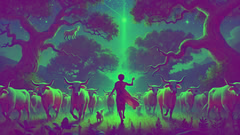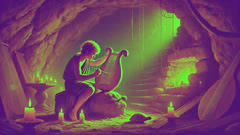Introduction
On a wind-whispered dawn atop Mount Cyllene, Maia cradled her newborn son with a wonder that quickened her pulse. Even before the first beams of sunrise danced across juniper trees and silvered olive groves, the infant’s dark eyes flickered with boundless curiosity and cunning promise. The mountain air hummed with anticipation, as if Olympus itself leaned closer to witness the birth of a god destined for audacious feats. Maia named him Hermes, “the messenger,” though none could have guessed the depths of his clever spirit and inventive heart. Beneath the ancient pines, every rustle of leaves seemed to murmur of hidden paths and playful secrets. As daylight filtered through twisted branches, the child stretched nimble limbs and tucked himself free from his cradle, slipping into the shadowed world beyond. His first breath carried the scent of dewy grass and warm stone, igniting a spark of daring that no swaddling cloth could contain. Unseen by mortal or divine eye, he charted a silent course toward the pastures of his brother Apollo, guided by an instinct woven into the marrow of his bones. That very night, beneath a canopy of stars and the approving glow of moonlight, Hermes began the first great odyssey of his brief but brilliant infancy—a heist that would reshape the harmony of gods and men alike.
Birth of the Trickster: Hermes’s Secret Origins
High on the windswept slopes of Mount Cyllene, where olive groves shimmered under a pale morning mist, Maia cradled her newborn son in the hush before dawn. Even in those first moments, he showed signs of boundless curiosity, his dark eyes widening at the subtle rustle of leaves beyond his swaddling. The air around them carried a faint hum of expectation, an echo of Olympus’s glittering halls far above mortal gaze. Beneath the towering peaks and whispering pines, this infant god felt the thrum of untold possibilities in every breath. Shadows of ancient legends coalesced in his tiny form, promising cunning deeds that would soon reshape divine tales. Maia’s gentle whispers mingled with the wind as she named him Hermes, “the messenger,” though his destiny extended far beyond simple errands. Around them, dew-laden grass glimmered like scattered jewels, hinting at the wealth of experiences awaiting the newborn’s touch. Even the gods above sensed a tremor of intrigue as word of his birth reached Zeus’s lofty palace. The rhythms of mountain streams and rustling branches wove around the infant’s cradle, an intimate lullaby celebrating both innocence and latent genius. Maia savored each heartbeat, silently marveling at the blend of mischief and brilliance that sparkled in his gaze. As daylight filtered through twisted olive boughs, Hermes reached out with nimble fingers, the first flutter of a destiny guided by wit and invention. That same afternoon, tempted by a distant curiosity, he slipped from his mother’s embrace without waking her. Unfurling from the cradle like a wisp of shadow, he began his first great journey, undeterred by swaddling cloth or state of divinity. Each step he took squeezed through hidden paths beneath rocky ledges, heralding the rise of a trickster unlike any who had come before. The stage was set for exploits that would blend audacity and artistry in equal measure. From the moment he touched the earth, Hermes carried the spark of restless innovation, ready to leave an indelible mark on both gods and mortals. Little did Olympus know that in this child’s playful heart lay the seeds of legend that would echo through ages.

Under a sky painted with drifting lilac clouds and the faint glow of a rising moon, Hermes charted a path toward distant pastures, guided by instinct and a mischievous heart. He darted along winding trails carved by mountain goats, every silent step echoing the precision of a seasoned pioneer. The world unfolded before him in a tapestry of scents: dew-kissed grass, pungent juniper, and the earthy warmth of sun-baked stone. Moonbeams danced on silvered olive leaves as he navigated hidden ravines, each hidden alcove revealing new clues to the realm beyond his cradle. Unseen by vigilant eyes, he gathered fragments of knowledge from whispers carried on the breeze, mapping the landscape with innate savvy. Hunger surfaced like a distant chord, urging him to seek sustenance among shepherds’ herds grazing near emerald meadows. Yet his gaze fixed on a more tantalizing prize: the sleek cattle belonging to the bright-eyed Apollo, whose herds grazed in harmony along rolling hills. Within Hermes’s inventive mind, a plan took shape—one that blended stealth and audacity in equal parts. He inspected the smooth hides and moonlit horns of the cattle, his gaze lingering on each animal’s gentle strength. With deft fingers, he fashioned sandals of woven reeds from nearby reeds, coating them in soft mud to muffle his footsteps. To disguise the footprints he would leave behind, he flipped the sandals so that the imprints told a contradictory tale to any who might search for him. The infant god’s heart pounded with exhilaration as he herded the animals toward a secret gorge, guiding them with a silent command he uttered only in his mind. Ancient magic pulsed through his veins, infusing his gestures with an unspoken authority that confounded mortal logic. As the herd moved in hypnotic rhythm beneath a canopy of starlit boughs, Hermes felt the thrill of forging his own destiny. Each lowing echo reflected off rocky walls as though the earth itself were celebrating his ingenuity. In that moment, the air vibrated with the promise of a new era where cunning craft and joyous invention would walk hand in hand through Olympus and beyond.
Before dawn’s first light touched the eastern horizon, Hermes guided the mismatched herd through secret gorges and across silent plateaus, each hoofbeat muffled by cunning illusions. Dust from the hoofprints drifted like golden motes in the low moonlight as he balanced youthful energy with precise calm. Silhouetted against distant ridges, the heifer shapes moved as one, entranced by a voice they could not resist—a whisper only a god could command. In his mind, Hermes counted each cow, marveling at how seamlessly his design unfolded, turning the impossible into reality with a child’s fearless audacity. He tilted his head to catch the faint resonance of bells from a nearby shrine, each chime a reminder that Olympus might soon stir in anger at this violation. Yet a spark of excitement flickered in his chest, for with every stolen creature, he shaped a legend that surpassed mortal ken. As he led the herd beneath an arching boulder bridge, he paused to trace patterns in the dusty ground, mapping each footfall as evidence of his growing mastery. A gentle breeze trailed him, carrying the scent of wild thyme and chipped stone, anointing him in nature’s tacit approval of his daring. Even the river that wound like a silver thread through the valley refrained from betraying his passage, its babble softened by unseen intervention. When at last he reached the threshold of his hidden grotto, he allowed himself a triumphant smile, knowing that this first conquest would be the cornerstone of a myth that future generations would sing. With a final glance under the porcelain sky, Hermes slipped into the sheltered cave, eager to measure his next moves by starlight and nascent ambition. Amid the flicker of firelight within, he sensed the pulse of life itself aligning behind his restless resolve. There, in that secret chamber, Providence whispered of future inventions and alliances yet unimagined, and the infant god embraced the promise of what lay ahead.
The Midnight Heist: Stealing Apollo’s Cattle
As the sky deepened into a tapestry of violet and silver, Hermes slipped from his hidden grotto with the sure-footed grace of a seasoned wanderer. The night air was cool and scented with wild thyme and soft pine, wrapping him in a cloak of silent anticipation. Before him lay the grazing herds of his brother Apollo, pawing at the dew-laden grass under a vault of starlight. Each cow shimmered like polished copper, their broad flanks reflecting the slender moon as if they bore moonbeams in their hide. Hermes paused at the crest of a gentle slope, surveying the field with a strategist’s eye, noting the placement of each sentinel shepherd, each watchful hound. He murmured a silent incantation, drawing upon that nascent power pulsing through his tiny frame. From his leather satchel, he retrieved the quirky sandals he had earlier devised, binding them snugly to his swift feet. The clever design imprinted footprints that led toward the northern hills, erasing any trace of the true path he intended to follow. With a cautious nod to the silent woods lining the pasture’s edge, he advanced, his cloak whisking softly behind him with each deliberate step. The herds, sensing a gentle command conveyed by his concealed magic, lifted their heads as one, ears twitching in obedient response. A faint smile curved his lips as he guided them like a maestro conducting a hush before a grand symphony. In that moment, the boundary between mischief and mastery blurred, revealing a cunning artistry woven into every gesture. Even the wind seemed to hold its breath, awaiting the unfolding of a spectacle crafted by a child god. Shadows draped around him like spectators cloaked in velvet, bearing witness to his silent procession. As he led a select group of the fattest bulls toward the forest’s protective veil, he reflected on the exhilaration of defiance and the thrill of rewriting expectations. His heart thumped with a rhythm that echoed across the silent realm, marking the beginning of a legend that would echo through hallowed chambers of Olympus. At that instant, the night itself became an accomplice in a nocturnal ballet of audacity and delight, choreographed by a fearless trickster. It was an extraordinary performance in the theatre of twilight, and Hermes savored every step of this secret choreography.

Moments earlier, a startled shepherd had glimpsed an unexpected disturbance near his flock, a fleeting silhouette vanishing like mist behind ancient oaks. But when he summoned his hounds to investigate, the clever god had already woven a veil of illusion, compelling the dogs to follow phantom tracks that led away from the true crime scene. Low, resonant barks echoed through the moonlit glade, bouncing off gnarled branches as if calling for guardians unseen. Hermes paused, crouching behind a knotted cypress, studying the diverted trio as they pursued empty brush along crooked paths. Each breath he took blended seamlessly with the night, his small frame a whisper on the wind. Farther off, a second shepherd brandishing a lantern approached in cautious steps, only to find nothing but dew-slick grass and distant calls of crickets. An impish grin flickered across Hermes’s face as he watched the frustrated search, knowing his design was flawless in its deception. Beyond the flock’s boundary stones, he had planted false hoofprints that pointed toward the foaming shores of a distant lake. With subtle gestures, he coaxed the chosen bulls to step lightly around clumps of hoofmarks, avoiding detection with the ease of a seasoned tactician. Lantern beams bobbed in the distance, searching to the east and west but failing to unmask his clandestine caravan. As the wind stilled in deference to his quiet artistry, the herd obeyed a silent melody hummed only within Hermes’s mind. The resonance of power in his fingertips guided each creature, weaving them together into a single, undulating movement. In that orchestrated hush, the stolen cattle moved through the midnight plains as though guided by an unseen conductor. And when at last the last bull passed the final grove marker, Hermes paused to offer a soft blessing to the restless earth beneath their hooves. He sensed nature’s approval in the rustling grasses and gentle creak of ancient limbs overhead, as if the world itself applauded his ingenuity. Then, with a final backward glance, he merged into the forest’s shadowed embrace, his path untraceable, and his legend set in motion. In the silver distance, spectral reflections danced across lily-strewn ponds, each sparkle sealing the secret pact between trickster and wood. Hermes slipped by ancient boulders and tangled roots until the horizon blushed with dawn, leaving behind only questions and silent wonder.
By the time the first rosy fingers of dawn caressed the eastern hills, the hush around Apollo’s pasture gave way to disarray. Shepherds raced between upturned earthen mounds and broken fencing, calling frantic names as they tried to reconvene their scattered flocks. Their lanterns bobbed like fireflies in the early mist, but no traces of the regal cattle remained upon the dew-slick grass. Apollo himself, radiant in golden tunic and carrying his lyre across one arm, arrived in a tempest of righteous fury that shook the marble porticos of his nearby temple. His eyes, deep and verdant, scanned the empty fields with the precision of a sunbeam tracing silent shapes. He stomped along broken footprints that led both north and east, each mark a riddle he longed to solve. In his chest, a cold knot of betrayal tightened as he recalled the promise he had made to keep his herds safe under lunar watch. The gathered crowd of herdsmen trembled under his gaze as he demanded answers, their voices faltering in reverence for the lord of light. Even before dusk fell the previous eve, Apollo’s intuitive fire had whispered of some unseen hand at work. He knelt to inspect a crooked track, his fingertips brushing against turned soil as if conversing with the earth itself. A low susurrus of wind carried a faint echo of laughter or perhaps the final note of a playful tune. That subtle melody prickled at his mortal ears, stirring an emotion he could not yet name. With the lyre cradled at his side, he set his resolve to follow the faintest threads of mystery. Each step carried him farther from certainty and deeper into a realm dominated by mischievous design. In his mind, images of unruly shadows and swift silhouettes flickered like embers of possible culprits. The golden god paused at the edge of a moonlit glade, pressing his forehead against ancient oak bark as though seeking counsel from silent wood. A single, haunting tone drifted on the breeze, and Apollo understood with chilling clarity that a new force, playful and inventive, had entered his domain. This realization struck him like a thunderbolt, forcing his features into a mask of determination and curiosity. Thus began the chase that would lead him to an unlikely sibling and the birth of an instrument destined to harmonize conflict and camaraderie.
The Lyre’s Song: Invention and Reconciliation
In the hollow heart of his shadowed cave, Hermes set aside all thoughts of escape with a focused determination he had never known before. He reached for a smooth tortoise shell resting near a cluster of flickering embers, its curved surface reflecting the warm glow of firelight. With deft fingers guided by an inner spark of ingenuity, he carved slits into the shell’s artistic contours, shaping a hollow resonance chamber that cradled possibility itself. Nearby, he drew from his satchel a set of taut sheep-gut strings, each goose quilled with divine tensile strength, and fastened them across the shell’s stretched form. His nimble hands plucked at the newly formed chords with experimental curiosity, producing a soft, hollow note that hovered in the air like a gentle question. Encouraged by the instrument’s warm timbre, Hermes adjusted the length of each string, refining the pitch until a clear, resonant melody emerged. The cave walls absorbed the playful tune, echoing it back in resonant pulses that danced across limestone surfaces. A single beam of dawn filtered through the grotto’s entrance, illuminating floating motes that seemed to applaud his creative feat. Borne upon that first delicate note, a sense of elation swelled within him, uniting mischief, art, and harmony in one singular expression. He experimented with finger placements, coaxing the gentle strings to produce both lively arpeggios and solemn drones with equal ease. Each variation felt like a conversation with the earth, the air, and even the silent stones that watched over his craft. When at last he drew the instrument to his face and allowed his breath to guide his fingers, a melody poured forth that transcended both laughter and lament. In that moment, the humble tortoise shell transformed into the birthright of musical gods, uniting all who heard it in shared wonder. Overwhelmed by triumph, Hermes carried the lyre to the cave’s mouth, where morning rays illuminated every fine detail of his masterpiece. As he gazed upon the elegant curves and polished strings, he felt the weight of responsibility and pride settle upon his shoulders. Music, he realized, was more than an echo of mischief; it was a bridge between hearts and a balm for wounds unseen. He tested each chord anew, marveling at how the interplay of dark and bright tones spoke of cosmic balance in a single breath. In that still dawn silence, Hermes heard the faintest promise of unity between brotherhood and invention, carried only by the gentle hum of his creation.

As Hermes climbed the moss-covered stones at the brink of his hidden cave, the gentle strains of the lyre followed him like a shimmering aura. He emerged into a dazzle of early sunlight, the gilded fields beyond still shimmering with dew and mystery. At the edge of the clearing stood Apollo, radiant god of sun and song, his expression torn between anger and intrigue. His lyre lay unslung at his side, strings taut but silent until now. When Hermes stepped forward, clasping his new instrument with reverent pride, Apollo regarded him with the measured curiosity of one accustomed to both brilliance and beguilement. Without a word, Hermes began to pluck a soft chord, the sound rippling outward like a warm invitation. Apollo’s stern features softened as the melody unfurled, weaving a tapestry of playful joy and gentle longing. Each note coaxed a flicker of a smile across the sun god’s lips, banishing the shadows of betrayal that had haunted his gaze. Hermes guided his hands in a fluid motion, coaxing the lyre into a cascade of harmonies that danced like golden rays across the meadow. Even the cattle peered from behind hidden boulders, drawn by the unexpected lullaby that seemed to reconcile heaven and earth. Apollo listened, enraptured by the seamless blend of mischievous spirit and profound beauty woven into every phrase. In that moment, he saw not a rival but a creative sibling, one whose restless mind had birthed an instrument of unmatched wonder. A hushed reverence descended upon the clearing as Hermes concluded the melody in a whisper of pure silence. Apollo’s voice, gentle yet resonant, broke the hush: “Brother, your art has softened my wrath and illuminated your heart.” At those words, Hermes bowed his head with a shy, triumphant grin, knowing the knottiest chord of conflict had been unraveled. Apollo stepped forward, extending his hand to reclaim the stolen herd in exchange for this gift of song. And so, under the gaze of awakening gods, forgiveness found its voice in the delicate harmony of a humble lyre. From that day forward, they forged a bond sealed not by oaths of power but by the shared breath of melody singing through eternity.
With Apollo leading the way, the brothers guided the herd back across dew-spangled meadows toward the gilded altars overlooking the Aegean Sea. Each hoofbeat of the restored cattle sang of unity renewed, their lowing harmonizing with the dawn chorus of larks. Hermes walked beside his radiant brother, his heart buoyed by the knowledge that clever mischief could coexist with honorable restitution. The path wound through ancient olive orchards where the wind whispered tales of forgiveness and fresh beginnings. Pilgrims crossing narrow mountain passes paused in wonder at the sight of two gods side by side, sharing laughter and purpose at first light. At the temple of Delphi, a new ritual took place as Hermes offered the lyre to Apollo in a gesture of eternal goodwill. Apollo, humbled and joyful, accepted the instrument with a solemn vow to cherish its song as a symbol of their renewed fraternity. Fire blazed in the hearth of the oracle’s chamber, flickering upon polished marble and casting dancing patterns on the assembled throng of seers and elders. A spontaneous melody arose when Apollo first strummed the strings of the borrowed lyre, as though the divine echoes of creation had been sealed within its frame. Smoke from sacred incense swirled into the vaulted ceiling, carrying the harmony of the first chords to every expected ear. In return for this gift of music, Apollo bestowed upon Hermes the title “Patron of Boundaries,” acknowledging his mastery over transitions and trails. Thus, Hermes became the guardian of travelers, heralds, and messengers, armed with both wit and song. Across the archipelago, sailors sang of his guiding notes, while poets evoked his image as a bridge between gods and mortals. The lyre itself found a hallowed place in temples and hearths, each new note a testament to the power of reconciliation. Generations would pass before any art so seamlessly wove cunning, invention, and harmony into a single form. In Olympus’s grand tapestry of myths, the cattle heist remained a playful prelude to a friendship steeped in respect and creative inspiration. To this day, the lyre’s gentle chords whisper of an ancient evening when two brothers found unity beneath starlight, forever shaping the music of the world. The story of that daring theft and its melodic remedy endures as a timeless reminder that even the smallest spark of mischief can ignite the flames of enduring legacy.
Conclusion
In the aftermath of the most audacious heist ever woven into the fabric of divine lore, Hermes emerged not just as a cunning trickster but as the architect of harmony between brothers and halves of a cosmic order. His invention of the lyre—born from the humblest materials and nourished by daring ingenuity—transformed theft into song, discord into melody, and mischief into art. Apollo’s forgiveness sealed a bond that reverberated across the heavens and into the hearts of mortals, validating the power of creativity to forge bridges where conflict once stood. From that night onward, music became a sacred thread binding gods, heroes, and musicians alike, from the marble halls of Olympus to the humble hearths of Greek farmers. Priests would chant of that first melody at Delphi’s oracle, poets would evoke its echoes in epic verse, and travelers would carry its memory on every shifting wind. In every note struck upon a lyre, one hears the echo of a newborn god’s restless spirit and the timeless truth that innovation, when guided by goodwill, can turn even a bold deed of cunning into a legacy of unity and inspiration.













